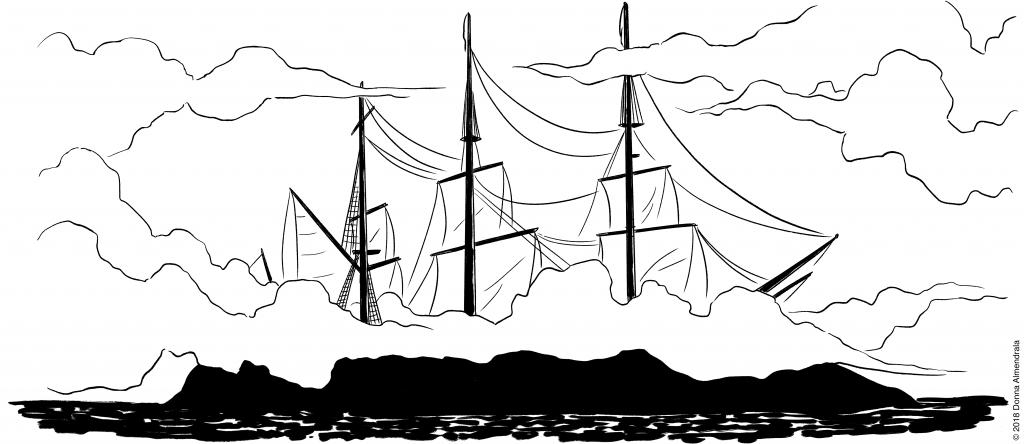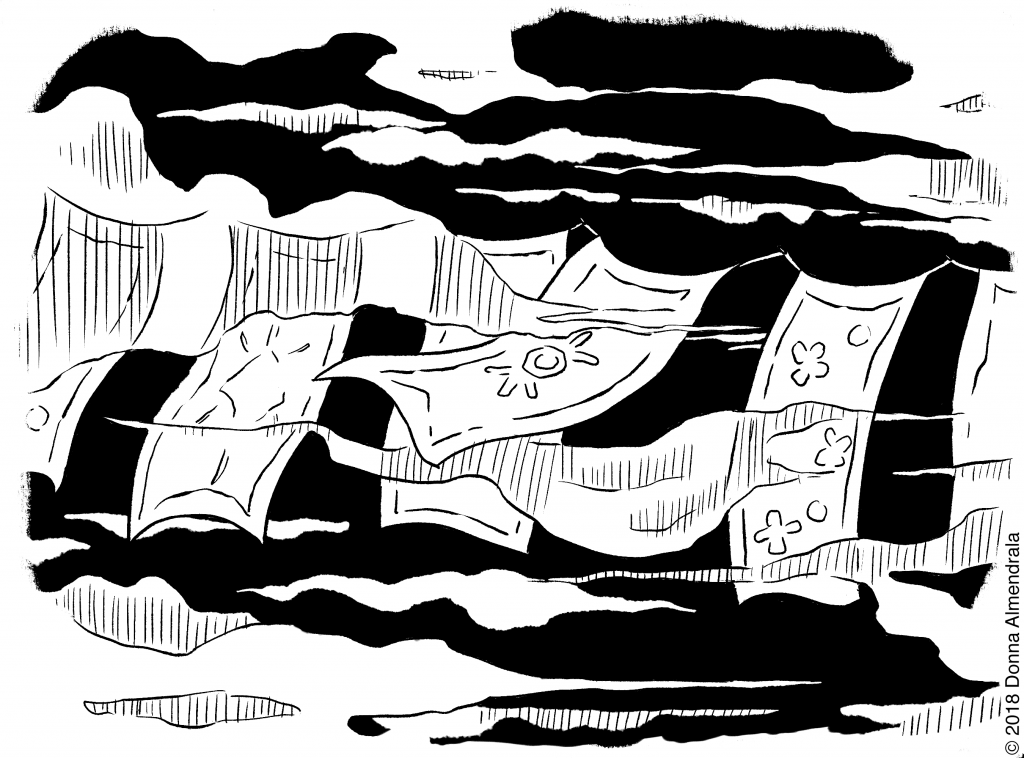
The girl’s grandmother often said to anyone who would listen that the mountain that cradled their town by the sea was not a mountain, but a ship.
‘The side that faces us, that’s her starboard side, and where the starboard side ends over there to the right, that’s her bow.’
She said this to so many people for so long that everyone was not quite as surprised as they should’ve been when it turned out that the mountain was, well, a ship.
To celebrate the not-quite surprise, the people hung long, streaming banners over the ship’s edge. The banners were the color of the country’s flag: yellow, green, blue, red, white, and black. Once hung, the banners flapped and whipped in the wind as clouds pouring from atop the ship enveloped them and then released them.
‘I expect she’ll set sail as soon as she sounds her horn,’ the girl’s grandmother said.
‘And when will that be?’ The people asked.
‘Any day now, from the look of things,’ she said.
Back in town, the girl’s grandmother ran a small linen shop, and it was her job to make the blue banner, which was the only banner not yet hanging from the ship. She worked hard to weave and to dye the banner before the ship set sail, and in her fatigue the wrinkles framing her blue eyes seemed to deepen. The girl helped with what she could, carefully draping the finished lengths of the banner from hooks and from rods. She then saw that her grandmother’s eyes matched the blue banner that filled the shop, and the blue of her eyes and the blue of the banner became one thing, and both wafted softly in the breeze that wandered through the open window.

When the girl finished helping she walked the short distance from the shop to the city’s edge, where there was a trail that led up to the ship. She did not know where the town ended and where the ship began, and so she was afraid that, if she started hiking, the ship would sound its horn and carry her away to who knows where. As she thought this, a cloud fell through the banners and then fell through her, and its millions of droplets kissed her in a million places with their icy lips. First it was all grey, and then it all became golden as the sun, dim at first, grew brighter and brighter, and then it was all blue skies, wind, and the ship in front of her.
Shivering and dripping wet, the girl hurried, arms folded, back to the shop where she plopped down in front of her grandmother, whose blue eyes she could still not tell apart from the nearly finished banner.
‘I think I want to be on that ship when it leaves,’ the girl whispered.
‘Oh?’ Her grandmother said without looking up.
The girl hesitated. ‘Don’t you want to know where it’s going?’
‘Oh, no dear.’
‘But why not? You know the most about it. Aren’t you curious?’
‘Well, it doesn’t much matter where it’s going — boats get wherever it is they’re going, and that’s all there really is to it.’
The girl frowned a bit. ‘I don’t understand.’
Her grandmother looked up at her, and smiled a warm smile. ‘I suppose you wouldn’t. Not yet. Where it’s going doesn’t matter — what matters is the going.’
‘You mean the boat ride itself?’
‘Sort of. More just being a traveler. The new places you see pass swiftly. You know it’ll all be gone tomorrow, so you feel everything. The tastes, the sights, the people and the way they speak — as much as you might feel the last bits of warmth from a sun that’s about to set. You learn to love a place more, because you know it’ll be gone soon.’
The girl listened and looked at her grandmother, and then she saw that it was herself sitting there at the work table, wrinkled hands weaving and dying one last patch of banner, blue eyes wafting in the cool night air. ‘That’s why you really want to go,’ she heard herself say. ‘To learn that, so you can come back and look at me and this place with new eyes.’
Outside, fog filled the streets, and the blazing streetlamp lights hovered in the air like dim stars. The ship’s horn sounded, as if coming from some great mechanical elephant. The girl, clutching the blue banner under her arm, climbed the trail to the ship, and she did not look back as the stars of the city faded into nothing. ![]()

